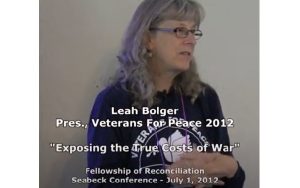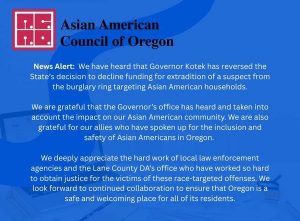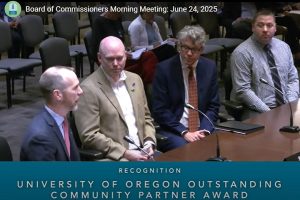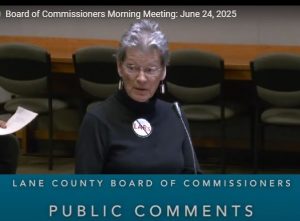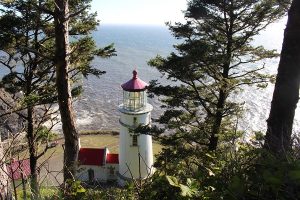Ratepayers carry cost, risk of testing unproven technology
7 min read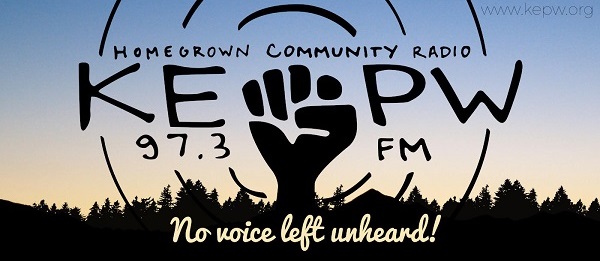
DJ Suss D (KEPW): I’m talking to Bob Jenks of the Citizens’ Utility Board. Mr. Jenks, what is the Citizens’ Utility Board?
Bob Jenks (Citizens’ Utility Board, executive director): The Citizens’ Utility Board is an advocate for utility customers, primarily residential utility customers. We work most at the Public Utility Commission, where the for-profit utilities like Pacific Power, Portland General Electric, NW Natural are always asking to raise rates and raise profits for their shareholders. We also represent customers in the Oregon legislature.
[00:00:32] DJ Suss D (KEPW): All right, and so, what happened in Portland with modular nuclear reactors?
[00:00:37] Bob Jenks (Citizens’ Utility Board): Right. What’s happening right now, it’s not just in Portland. It’s around the state. Pacific Power, which serves a bit of Portland and then serves pockets throughout the state, including a wide variety around Lane County, is looking at doing a series of small modular reactors of a kind that Bill Gates has been promoting called TerraPower that have molten salt in them to add storage to them so they can ramp up and down (unlike conventional nuclear power plants).
[00:01:07] And first they put one in their IRP and the resource plan, and then they expanded that. So they have now agreed to build five of these things. To me, it’s insane that not a single one’s been produced. The fuel isn’t being produced. There’s no design that’s been licensed. It’s not sure how much it’s going to cost.
[00:01:25] So I’m not sure how long it’s going to take to build these things. And suddenly you’ve got a utility talking about adding five of them to the system. It really is insane based on the experience this region has had with nuclear power, the failures of it in the past.
[00:01:39] DJ Suss D (KEPW): They’re having so much trouble. Why is that happening?
[00:01:42] Bob Jenks (Citizens’ Utility Board): A lot of it is that we haven’t built nuclear power plants in this country for decades, with the exception of the one that I think was just completed this year that had massive cost overruns and delay in that power plant. That’s a conventional nuclear power plant.
[00:01:58] Now everyone’s saying, ‘We’ll do new nukes, but we’ll do a different design.’ But a different design means it’s untested, it hasn’t been licensed by the NRC, and nobody knows for sure how long it’s going to take, nobody sure is how much it’s going to cost.
[00:02:12] And a lot of these small reactors need a different kind of fuel, a kind of fuel called a high-assay, low-enriched uranium (HALEU). The only place that you can get that right now is from Russia. And so the Biden administration and the IRA (Inflation Reduction Act) put out funding to come up with a source of that production of that nuclear fuel in the U.S. But that’s now, filing today. They’re delaying for two years the proposal to manufacture that fuel. So right now, the fuel isn’t available for a lot of these plants, even if they could build the plant, even if they had a design that was licensed on down the line.
[00:02:55] So it’s just to me, it’s highly speculative with, I’ll be honest, with climate change, we have to have non-emitting power. There may be a role for nuclear power. These new nukes may be part of that solution. But the question is: Who should figure that out? Should it be done on the backs of customers or should it be done by somebody else?
[00:03:18] If it’s done on the backs of customers, should it be done in a region of the country where we have vast hydro resources and a lot of hydro capacity which is non-emitting? Or should it be done in a place like Colorado that’s got to serve a winter load, doesn’t have the same renewable basis, doesn’t have the hydro resources we do, and will have a problem.
[00:03:36] It has a more challenging time. So my belief is here in the Northwest, we’ve got a good set of resources: solar, wind, hydro. We can sort of sit back and let the other parts of the country that need to solve some of these problems more than we do, let them take the risk. Let them go forward and learn from what they do and slow down and not this overreaction. This desire to be first with things that nobody’s ever done before is really a risky behavior on behalf of customers who are ultimately going to have to pick up the bill for this.
[00:04:11] Utilities are looking for ways to solve the problem of how do they serve power 24 hours a day with resources that don’t eit carbon emissions, that don’t contribute to the climate change. Renewables are generally intermittent. They don’t happen all the time.
[00:04:27] Battery storage is limited to the number of hours that you can put into a lithium-ion battery. There’s more things coming down the road that will help solve some of those problems. But right now, there’s limitations on them. And utilities are used to these dispatchable plants that they can really, really control up and down.
[00:04:46] And nukes give them some ability to do that. So if you’re somebody involved in the supply side on the utility, it’s kind of attractive to do this. If you’re an investor-owned utility, a for-profit utility, you make money for your shareholders by making investments. And an investment that’s in the billions of dollars?
It’s really, really exciting because the higher cost of the investment, the higher the profits for your shareholders. So for the for-profit utilities, nukes look really, really good for their shareholders, but it’s a really risky thing for the ratepayers.
Now you asked about the subsidies and the risks. The federal government’s talking about putting some money in from the federal budget to help develop a new line of nukes and then the utilities that invest in these put their customers on the hook.
[00:05:36] The utilities get to pass their costs on through to customers, generally. And so if a utility is committing to doing something that’s never been done before, they’re committing their customers to pay for it. And that’s where the real risk that we’re concerned about is, is customers really shouldn’t be venture capital.
[00:05:55] We shouldn’t be doing these brand-new ideas that nobody’s ever done before. Venture capital has a much different role in our society and customers ought to be served with mature technology that we know works, that’s low-risk, and that’s how we keep rates affordable for folks.
[00:06:12] DJ Suss D (KEPW): The money can be spent better elsewhere.
[00:06:14] Bob Jenks (Citizens’ Utility Board): Yes, it’s always better to let somebody else try something new before you go and do it. Though again, the engineers and the people in some of these planning departments, they get excited about being on the cutting edge and trying new things.
[00:06:26] But the problem is, they’re creating risk for their customers and that’s who we’re concerned about. There’s been a lot of inflation in utility bills in the last couple years. There’s a lot of customers who are struggling to pay their bills. We see thousands of customers shut off their utilities every month in Oregon because they can’t afford to pay.
[00:06:46] And so we ought to be doing what we can to keep costs and risk down for the customer who has to live with the decisions made by their utility.
[00:06:54] In Oregon right now, you can’t build a nuclear power plant until there’s a permanent waste storage facility. So there is a problem for utilities in Oregon is: You can’t build them here. You can build them out of state and import the power, but you can’t actually build the plants themselves in Oregon under current law.
[00:07:12] DJ Suss D (KEPW): The bacteria in the sewage treatment plant would actually produce electricity. So there’s plenty of alternatives, isn’t there?
[00:07:18] Bob Jenks (Citizens’ Utility Board): Yeah, and there’s more being developed all the time. There’s new forms of batteries that have much longer lives and can store energy. There’s a lot of money going into research and development in this stuff.
[00:07:29] The important things we ought to be paying attention to are emissions. We need to be reducing our emissions and trying to move and make rational, smart investments in clean technology that get us to drive our energy economy into a non-emitting system. But the more we take risk, the more we raise rates for things that don’t work, the harder it is, the more we squeeze out other investments that are good investments that make sense for customers.
Customers can only afford a certain amount of additional cost, and we should be putting that into clean technologies that drive down emissions as fast as possible in the long term, and that’s really what we should focus on. And a lot of it is still the basic building blocks we’ve been talking about for decades.
[00:08:17] Things like energy efficiency, reducing demand for energy to begin with, on the front end; solar, wind, a lot of this, most of the technologies for a low-carbon utility system exist today, and it’s just a matter of making the investments and managing these things well.
[00:08:35] DJ Suss D (KEPW): All right, Bob Jenks. How do people support Citizens’ Utility Board?
[00:08:39] Bob Jenks (Citizens’ Utility Board): We are a membership-based organization, a statewide nonprofit in Oregon. They can go to our website oregoncub.org and find out lots of information for us, find out how to donate and contribute to support the work that we’re doing. It’s oregoncub.org.
Listen to DJ Suss D on “Talk Is Cheap” every Saturday at 4 p.m. on KEPW 97.3 FM.
